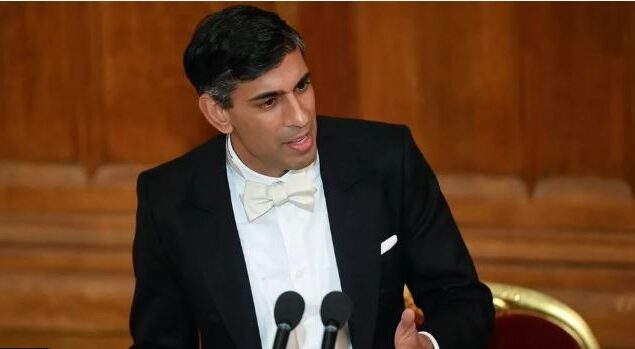Ukraine war: While the Pope calls minority ethnic soldiers “cruel”
The Pope's remarks that some minority groups of soldiers had acted worse...

Rishi Sunak
The prime minister referred to the deeper economic connections of the previous decade as “naive” in his first statement on foreign policy.
He asserted that in order to compete effectively, the UK must now replace wishful thinking with “strong pragmatism.”
However, he cautioned against “Cold War rhetoric,” saying that China’s importance for the world could not be disregarded.
Since becoming the Tory leader and UK prime minister last month, Mr. Sunak has come under pressure from conservative backbenchers to take a more aggressive position against China.
The address was given at the Lord Mayor’s Banquet in London and comes following protests over China’s stringent Covid shutdown restrictions over the weekend.
A BBC reporter was detained by police on Sunday while covering a protest in Shanghai. Police have also made a number of arrests. During his detention, the cops assaulted and kicked him, and he was detained for a while before being let go.
Business executives and foreign policy specialists in the audience were informed by Mr. Sunak that China had “decided to crack down harder, including by assaulting a BBC journalist,” in response to the protests.
As China progresses toward even greater authoritarianism, he stated, “We recognise China poses a systemic risk to our values and interests, a challenge that grows increasingly acute.”
The “golden period” of UK-China ties and the “naive belief” that more commerce with the West would result in Chinese political reform, he continued, were “gone.”
Under former Prime Minister David Cameron, there was a “golden era” of deeper commercial connections, but since then, ties between London and Beijing have gotten worse.
Mr. Sunak emphasised, though, that “we cannot simply disregard China’s role in world affairs – to global economic stability or concerns like climate change.”
In order to “handle this increasing rivalry, including with diplomacy and engagement,” he continued, the UK would cooperate with allies such as the US, Canada, Australia, and Japan.
It entails opposing our rivals with strong practicality rather than lofty rhetoric, he continued.
At the G20 conference earlier this month in Indonesia, Mr. Sunak and Chinese President Xi Jinping were scheduled to meet for the first time. However, the meeting was postponed as a result of a missile explosion in Poland.
As part of a review of the UK’s foreign policy, Mr. Sunak’s predecessor Liz Truss reportedly intended to reclassify China as a “danger” to the country.
Mr. Sunak highlighted the review’s description of China as a “systemic challenge” in his remarks. In the coming year, he promised, there would be more information about the review.
Iain Duncan Smith, a former leader of the Tories, was one of many backbenchers who pushed for a stronger position, but he criticised the speech’s use of the phrase “robust pragmatism.”
He stated in the Daily Express that China had turned into a “clear and present threat to us and our allies” in response to a preview of the speech.
He continued, “I wonder if strong pragmatism today sounds more and more like capitulation.
In actuality, we have no idea what this new strategy will actually amount to at this time.
More information on the so-called Integrated Review, which would outline the UK’s national security and foreign policy, is promised by Mr. Sunak for the coming year.
However, we already know how China is currently referred to: as a “systemic problem”.
The government wants people to realise that human relationships, including international ones, are complicated and nuanced and that the UK’s interests would not be served by a binary approach.
However, the failure to label Beijing as a “threat” is seen by the prime minister’s detractors as a grave error.
David Lammy, the shadow foreign secretary for Labour, criticised the speech as being “thin as gruel” and charged that the prime minister had “flip-flopped its rhetoric on China.”
In other parts of his address, Mr. Sunak expressed his commitment to continuing to stand behind Ukraine, saying: “We will stand with Ukraine for as long as it takes.”
The British military assistance to the nation will be “maintained or increased” in the upcoming year, and new air support will be provided to safeguard civilians and vital infrastructure.
Earlier this month, Mr. Sunak paid a visit to Volodymyr Zelensky, the president of Ukraine, during his first trip to Kyiv following his arrival in Downing Street.
During his visit, he declared that the UK would enhance its training offer to Ukraine’s armed forces and provide more anti-aircraft guns and radars.
Olena Zelenska, the wife of President Zelensky, paid a separate journey to London on Monday and talked there about alleged sexual assault by Russian troops in Ukraine.
Catch all the International News, Breaking News Event and Latest News Updates on The BOL News
Download The BOL News App to get the Daily News Update & Follow us on Google News.